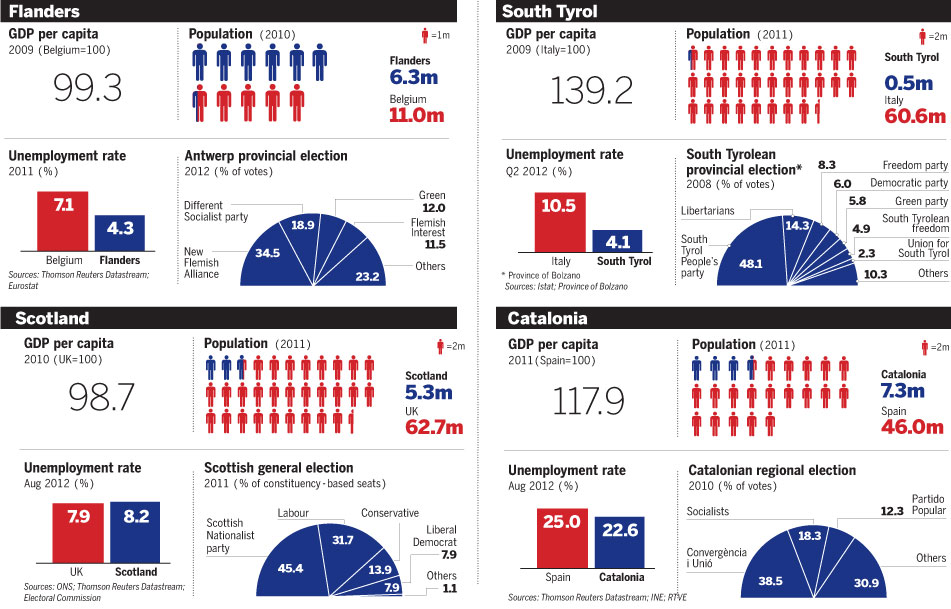No-fault separatism thanks to globalization
 Monday, November 12, 2012 at 11:06AM
Monday, November 12, 2012 at 11:06AM Old argument of mine: globalization comes in and all manner of divorces ensue. Typically it's a fake state in the Gap that's coming apart at the artificial seams, but the larger point is, the more overarching multinationalism you have, the lower the cost of divorce/remapping. You're going to be together anyway (you still have the "kids" of the union), but why stay together if you don't have to?
Europe demonstrates this: the more integrated it becomes, the more states appear.
Great FT one-pager on "long-simmering separatist movements . . . gaining strength." You might think it's the Eurozone troubles that is responsible, but that's the proximate opportunity - not the ultimate enabler. Real federalism is coming, so why not get out of your unhappy marriage in the bargain?
Here's the counterintuitive part: it's often the most competent and richest that want out. The better want to leave behind the worse.

So this isn't about suffering. This is about ambition.
 EU,
EU,  Europe,
Europe,  development,
development,  globalization | in
globalization | in  Citation Post |
Citation Post |  Email Article |
Email Article |  Permalink |
Permalink |  Print Article
Print Article 









Reader Comments (3)
"Here's the counterintuitive part: it's often the most competent and richest that want out. The better want to leave behind the worse.So this isn't about suffering. This is about ambition."
This generalization might fit to some cases as mentioned above. Croatia and Slowenia were the richest regions of Former Yugoslawia which didn´t want to pay for the Serbs anymore, but the seperartion was very bloody and a lot of suffering.But in other cases the most backward regions like Tibet want also to seperate from the more affluent region (China). And if you start this sort of dynamic you might disintegrate whole nation states and even the region. First the nation state collapses and then the fight will be within every region. I don´t like this whole idea of Europe of the regions.Would you like to see California and the East Coast seperating from the Midwest an the rest of the USA? Would you like to see the desintegration of the USA? Or of China?Or of India? This would produce a lot of suffering. Maybe a new American civil qar (one was not enough) Even some politicians in Bavaria are thinking about seperating from Germany. And what you call "ambition" is the greed of the wealthy and rich who don´t want to pay for the poor.Ayn Rand and the libertarian would like this idea.
Random thoughts:
I hadn't heard about South Tyrol--I wonder if they're considering a reunion with their relatives in North Tyrol, as part of Austria or as an independent state?
From what I've heard, folks in the South of Italy aren't any happier with the union than their northern cousins. If they can talk Tyrol and Co. into taking their share of the Italian debt with them, they may come out of the divorce okay.
The Catalans should be careful. If folks in Madrid are smart, they'll open the door for their departing cousins and invite their indebted co-linguists in Valencia (the ethnologue entry for the language is Catalan-Valencian-Balearic) to follow them out. ;)
Scotland may be a partial exception to your theory. They may have oil wealth, but the capitol they're seceding from has other wealth sources besides and a LONG history of antagonism reaching back to the Middle Ages. Call it a divorce on emotional instead of financial grounds.
I was living in Canada in the Mid '90s during the most significant Quebec Independence referendum. There were lots of credible 3rd-party economic analyses of an independent Quebec, that showed such a country would certainly have a standard of living much less than current Canada. Part of the problem was that the politicians advocating separation were selling a bill-of-goods, implying Quebec would be "independent" but would use the Canadian currency, Canada would continue to pay retiree benefits, there would be an implicit free-trade-zone between Quebec and the rest of Canada, etc. (This included the premier of Quebec, and Oxford-trained economist, who certainly should have known better!)
Similarly, I saw an analysis that said a new Catalunya,with a reasonable allocation of Spanish debt, would start out as bankrupt.
So I think most of these movements are "bovine effluent," and reflect political concerns rather than economic possibilities.